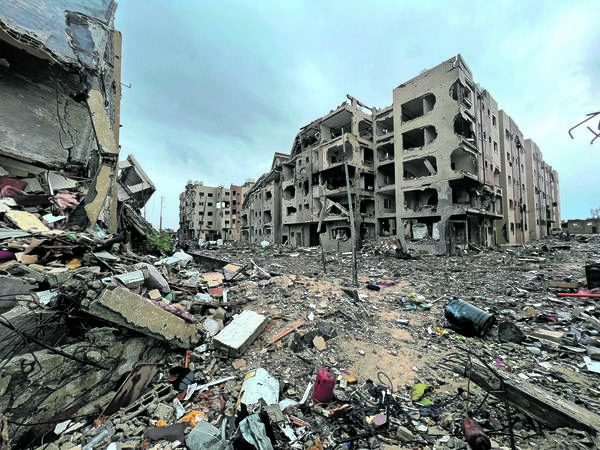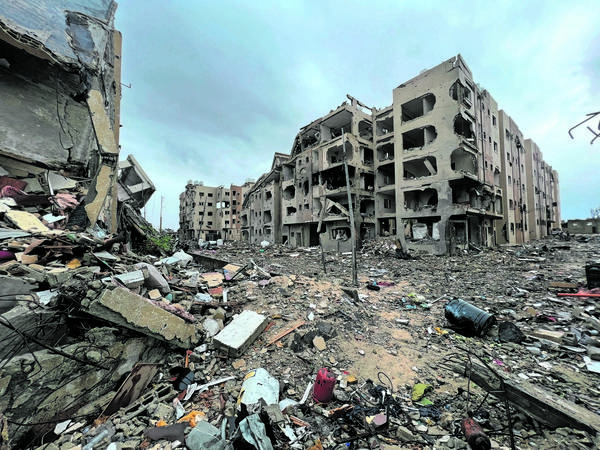

‘Mine is the only ghost who weeps/ It seeks justice before peace/ Say my name and pray for me/ I am not a number, hear my story.”
So go the lyrics of a just-released song titled The Ghost Who Weeps by The Mavrix, a Johannesburg band.
This wistful, acoustic-guitar driven song has all qualities to make it a hit beyond South Africa’s borders — hook-laden, well-produced music and compelling lyrics.
Except, it has the line, “from the river to the sea, Palestine will be free”, a slogan that, since the Israeli onslaught on Gaza began, has been banned in Austria and Germany.
In England, the Labour Party suspended MP Andy McDonald for using it in a speech at a pro-Palestinian march, according an Al Jazeera report. The country’s football association even banned players from using the slogan on their private social media accounts.
But for folk six-piece The Mavrix, it does not matter, because what is happening in Gaza and Israel now is way too personal.
In fact, what is being described as genocide of Palestinians is what got the band’s guitarist Jeremy Karodia to come out retirement and co-write The Ghost Who Weeps.
“All I want is for the song to remind South Africans to show compassion to Palestine,” he says in an interview this week.
The lyrics are a mixture of poems by two friends who he referred to as “comrades from Hebron and Gaza”. They have lost family and friends in the conflict.
“At the beginning of the genocide, at about 1 o’clock in the morning, one of our comrades who is in Gaza called my wife and me. He said that Israeli soldiers on the West Bank had attacked his village [the one where his family lives].
“Tragically, three of his family members lost their lives, while his 14-year-old son sustained a gunshot wound to the leg but miraculously survived. Additionally, his 12-year-old son was taken into custody and remains detained as we speak.”
Karodia says the next morning, his Palestinian friend sent a poem he had written the night his world got rocked by the war.
“He had just gone through something very traumatic, and the poem was not about his family but about Palestine. He wrote about the mothers of Palestine, he wrote about the fathers of Palestine, as well as the children of Palestine.
“He wrote about how resilient they are, in just three lines,” Karodia says.
A few days later, another Gazan friend, who had stayed with the Karodias in Johannesburg in January, called.
The Israelis had bombed his flat, and there was no way for him and his seven and five-year-old girls to stay.
“They were given warnings to evacuate the building. All he took were documents for himself and his children. Everything he worked hard for and all that’s left are documents in his pocket.”
He also wrote a poem about Palestine which Karodia incorporated in the song.
“I told him I wrote a song using words from his poem; he said I should send the lyrics. I did and he said, ‘I am in tears.’ He asked me to send him the song.
“He insisted, so I sent it. He wrote back after and said, ‘I am frozen.’ Promptly thereafter, he went dark for 36 hours.”
Karodia says that his comrade then responded with a video of one of his daughters listening to the song and crying. He also sent pictures of his girls with wounds on their legs.
While the media coverage of the devastation in Gaza is harrowing, personal images such as these are especially distressing.
“I have never experienced anything like this, not even under apartheid — it is emotionally draining,” says Karodia, who describes himself as someone with activism in his DNA, who used to fight the injustices of apartheid in the past.
He says speaking out has just been difficult because the social media posts and songs he puts up to show solidarity for Palestine are being pulled down.
“What else are we supposed to do? How can we help when the forces that be are stopping all our efforts?”
The Ghost Who Weeps was released on 29 November, the International Day of Solidarity with Palestine. It stands as a testament to the enduring solidarity between South Africa and Palestine, says Karodia.
He adds: “Nelson Mandela once said, ‘Our struggle will never be defined as free as long as the Palestinians are not free.’ So, the song is a reciprocation of the solidarity they showed us.”

Clearing up the ghosts of a song with a mysterious history
If you are from a certain vintage and demographic, the opening bars of The Ghost Who Weeps are likely to take you straight back to the 1970s. At the time, every wannabe guitarist, especially from South Africa’s Indian or coloured areas, would have learned to play their instrument by practising a song called Shireen’s Theme.
Johannesburg guitarist Jeremy Karodia, who composed the song The Ghost Who Weeps to coincide with the International Day of Solidarity with Palestine this past week, and recorded it with his band The Mavrix, decided to base the song on the famous tune with a mysterious past.
“The Fordsburg and Fietas guys claimed that someone called Sam from Fietas composed it,” Karodia says. “Yet other guys said it was composed in Durban by one or the other band.
“As a composer, I am very aware of composers’ rights and credits. “So, for the past 30 years, I have wanted to record a version of the song but having engaged with musicians and cultural historians I could never get who actually wrote the song. So, I didn’t record it.”
That is until now, when he spoke to Mahomed Gany, a 70-year-old semi-retired Durban businessman who comes from a family with deep roots in in that city’s rich music scene from the early 1960s onwards.
His dad Ahmed, who had a real passion for music, established the famous Raj record store, which evolved into a chain of stores, a studio and the promotion of local bands.
I contacted Mamomed and he tells me, in the 1970s, he started the related Taj Record bar, with Underground Den, which Durban’s young hip crowd “packed like a supermarket” every weekend in search of the latest imports.
But the story of Shireen’s Theme by a local instrumental dance band called Los Pepitos dates to around 1967 when Mahomed was about 14.
“We were involved in producing the famous groups of Los Pepitos, the Raiders, the Duke’s Combo and a whole lot of artists back in the day,” he says.
Los Pepitos used to play at the Butterworth Hotel near his dad’s record store. They wanted a recording like what the family had been doing for the city’s other top bands.
“My late brother Joe, my dad, myself and my other brother Babu then went to Butterworth Hotel and met the band.
“And my brother Joe, who had just come back from Lorenzo Marques [Maputo] a week earlier, told us about a tune a band played in a nightclub there.”
But he couldn’t get the name of the tune. So, he whistled it to the band members of Los Pepitos.
“And the drummer says, ‘Yeah, I think I know it.’ And he whistled it too, and told the guitarist, ‘This is what it is.’
“And they played it. And my brother said, ‘See, I think that’s it.’ It sounded beautiful.
“But my brother said, ‘Okay, we do the recording with this here … and we’ll start with this song as a first recording. But there’s no title to it.’
“My brother was very fond of our little sister, Shireen. And he said, ‘We’ll name it Shireen’s Theme. My dad said, ‘What a beautiful name. What a beautiful tune.’”
It became a massive hit for Los Pepitos, with numerous covers made of it, and many versions still heard to this day at weddings and other celebrations and parties.
Gany says it was a “total surprise” to hear from Karodia and that he was just happy he could help clear up at least some of the mystery around the song’s history.
Karodia is grateful because, as he says, it’s those first four bars “that maketh the song”. — Charles Leonard
The post Stir over song of solidarity appeared first on The Mail & Guardian.
A Joburg band has written lyrics based on poems by friends who are suffering in Palestine
The post Stir over song of solidarity appeared first on The Mail & Guardian.




